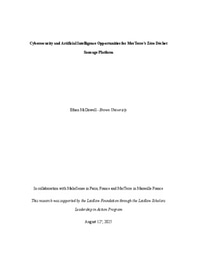From Gaps to Governance: A Global Legislative Review on Diffuse Abandoned Waste
Abstract
This report examines the legal and practical treatment of diffuse abandoned waste, defined here as small, easily dispersed items such as cigarette butts, wrappers, tissues, cutlery, and straws that fall outside conventional waste systems. Using a comparative approach, it analyzes the European Union framework and three national systems, France, Japan, and Canada, to identify strengths, gaps, and opportunities for reform. The findings show that no jurisdiction studied provides a formal legal category for diffuse abandoned waste, which leaves monitoring fragmented and enforcement inconsistent. France relies on the Code de l’Environnement, expanded producer responsibility, and penal provisions that target abandonment in general terms, yet lacks targeted obligations for micro scale litter. Japan couples a dedicated marine debris statute with strong municipal implementation and life cycle plastics policy, which reduces leakage in practice but does not isolate diffuse litter inland. Canada combines a federal Zero Plastic Waste Agenda and single use plastics prohibitions with provincial producer responsibility schemes and municipal cleanups, which create clear levers for upstream reduction and cost recovery, yet still do not define or track diffuse litter as a distinct stream. Across all cases, data from citizen science platforms remain under-integrated into binding policy. The report recommends adopting a harmonized definition, creating targeted monitoring requirements tied to producer responsibility, and embedding standardized citizen science data into statutory reporting, so that organizations like MerTerre can translate localized evidence into enforceable, system level change.


Please sign in
If you are a registered user on Laidlaw Scholars Network, please sign in